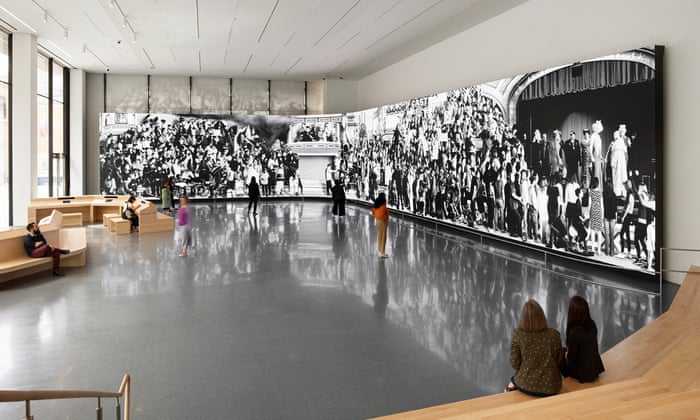 |
| Photo: © Stan Banos |
I left New York at the turn of the century, after 40+ years of being a hard core, native New Yorker. Something had changed, I felt it was part me and part... New York itself, the home I had so loved, respected and championed. Of course, when you live in the midst of something, are surrounded by it, engulfed by it- it's often hard to view things fairly, proportionately or even rationally. All I knew, is that for the first time in my life, New York felt alien to me, something now strangely apart from me, no longer just the natural extension of everything both good and not so good about me and every other of my fellow New Yorkers... I had long ago stopped romanticizing New York, I knew it cared nothing about me, neither as individual nor as the very smallest of its cogs, but even the sense of mutual, sustained respect for having withstood everything it had thrown my way both as child and adult had suddenly begun to wane and tarnish.
My favorite scene (the only worthwhile scene in my opinion) from Martin Scorsese's abysmal Gangs of New York was the very end, where New York's skyline morphs and transforms throughout the decades, a CGI transformation that embarrassingly almost brought me to tears, particularly since my parents first arrived at its shores in the early fifties having "migrated" from Puerto Rico and settled in a $40 cold water flat on Crosby St. in... SOHO. I sensed that I was getting older, no longer part of the generation that was changing New York on a street or cultural level, but something else was going on, a change that was occurring and metastasizing from what seemed to be outside forces well beyond the farthest reaches of its outer boroughs. And I saw it all around me, the rampant gentrification, the disappearing neighborhood joints and landmarks, the skyrocketing prices of anything and everything imaginable, and the not so tangible but very definite change of... attitude.
And the latter was the most mystifying to me, I couldn't-quite-put-my-finger-on-it, although the new Domino's Pizza on Third Ave. off St. Marks did offer the most viable of clues- how did such a shit ass, cardboard chain eatery invade and survive New York City, the only place in the US of A where you could actually get good great pizza? Pizza, the NY/NJ poor man's staple that one could eat cheaply, plentifully and deliciously in any of its five boroughs! Couldn't figure it out for the life of me- what semi-sane, self respecting New Yorker would ever patronize such a place? And the answer was... but a block away, at NYU's most recently built dorm. New York was now conforming not to the needs of its working, everyday residents, but to the well monied interests of those moving in and having it conform to them, both on the micro and macro level. Domino's, of course, being the very least of it, as high priced chain boutiques and luxury condos with or without "poor doors" became the norm, just as New York street attitude, whatever one may think of it, was being replaced by the shrill, outright arrogance of its well heeled, elitist new comers.
And that is what Vanishing New York, How A Great City Lost Its Soul by Jeremiah Moss makes abundantly clear in the most minute and meticulously researched detail. This is not a vanity publication of some curmudgeon's opinions and biased observations, as some would like to allege; Moss backs up his claims with an abundance of facts and historical data. Critics like to point out that New York has always been in flux, constantly changing and morphing- one says flat out, "Someone give Moss a Metrocard," so he can see all the working class diversity in Bay Ridge (my place of birth); this critic, allegedly paid to write and "think," obviously clueless to the fact that he just proved Moss, right- having to go to the outer boroughs to finally reach a diversified working class community! Even The High Line, that most seemingly benign, beneficial and contemplative of new New York's additions, was little more than the stealth juggernaut for destroying that entire neighborhood to pave way for monstrosities such as Vessel, that (if I may quote myself) "monumental monument of monumentous proportions that affords the monied
elite living 'round it the grand view of watching the minions below
them walk endlessly about within its circle going nowhere."
Despite all the changes and evidence all around me some twenty years ago- I couldn't see the forest for the trees! And that is what this most depressing, yet fascinatingly detailed, chronicle of a book so clearly recounts and outlines- the unmaking of America's most uniquely original city into base camp for the world's filthy rich and boorishly boring...
The irony on my part, of course, is that we moved to San Francisco, the only other American city that had long intrigued me as an open, viable city; and although we did catch a few good years, what occurred in New York in thirty years, happened here in ten- thanks to the high tech, geek elite whose only sense of community lies solely within the parameters of their virtual online reality- and the dollars it affords them! Like their ultra rich cohorts in New York, they have successfully devolved a city once abundant in character, and have done so by transforming it into yet another anonymous platform on which to place their laptops and $5 coffees...









